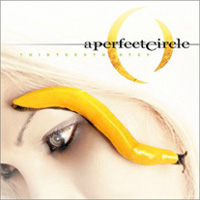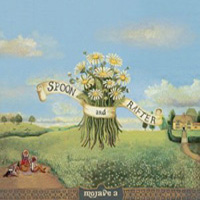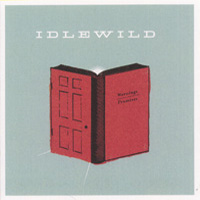 Idlewild
Idlewild
Warnings/Promises (Capitol)
An interview with vocalist Roddy Woomble
By Tim Den
Idlewild‘s last two full-lengths, 100 Broken Windows and The Remote Part, became staples in my “all time favorite albums” club immediately upon their release. Vocalist Roddy Woomble’s literary-minded prose and earthy delivery, coupled with irresistible melodies, made Idlewild more than just another British band with god-given talents for hooks and rockin’ ballads. There was something indescribable in the sum of their parts; something bigger, grander that couldn’t be dissected beyond “just great fucking songs.” Perhaps ’twas the Scottish existentialism that gave the proceedings a dignified, soul-afflicting relatability, or perhaps it was just that songs like “American English” ranked up there with “Hey Jude” in terms of universal appeal. It’s like these songs have always existed in the air and in your heart: you just had to hear them played out loud.
Warnings/Promises, then, is about as anticipated as they come around these parts. But which of the predictions made in the title will it bring? Will the album be as sonically devastating as The Remote Part‘s closer “In Remote Part/Scottish Fiction” hinted at (the dueling guitars being the first appearance of now-second guitarist Allan Stewart)? Or will it try to push the band’s “pop appeal” even further in search of “greener” (if ya get my drift) music business pastures?
Amazingly, Idlewild chose neither. The former punk boys who’ve progressed with each release have done it again: They’ve left behind the past and found a whole new palette. Known for their addiction to Slayer as well as Americana, the band – having come close to the former in their early years – have taken on the latter’s sensibilities and produced an album full of dusty winds and gravel roads. Along the way, some instantaneous gratification was lost – the songs are nowhere near as “punch in the face” upon first listen as anything on The Remote Part – but in return have picked up hitchhikers Left-of-Center Chord Progressions and Irregular Song Construction. Instead of taking the listeners straight to the destination, Idlewild now take ’em around the ol’ Pecos Ruins, deserted gas stations, and a few graveyards before swinging a few crazy turns and returning home. It might take longer than it used to, but the trip is still just as fun. Opener “Love Steals Us From Loneliness” fools you into thinking “oh, this is just like the old Idlewild” before strangely sneaking in unexpected major chord changes during the chorus. No small feat considering the chorus is supposed to be where a song anchors its catchiness. The same scenario repeats itself throughout Warnings/Promises: Just when you think you’ve got the patterns down, they go and switch it on you. “I Want a Warning” and “The Space Between All Things” start off like The Jon Spencer Blues Explosion covering Snow Patrol, but quickly reassure us of their Idlewild-ness with monumental vocal lines. The band have made it clear: They are not staying put, nor content to rehash their past.
A few entries play it relatively straight (“Welcome Home,” “El Capitan”) – nothing to complain about, since Idlewild playing pop rock songs is about as awesome as music gets – but overall, Warnings/Promises is a record that will take fans and strangers’ investment before fully revealing itself. Don’t think of it as “work,” though, think of it as the effort you had to put in as a kid when you explored in the forest. What fun would there be if you always hung out at the playground, where everything’s clearly defined with instructions? Sometimes the biggest rewards come from first getting lost.
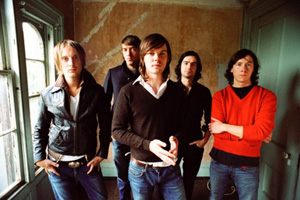 I know you’ve been asked this a million times, but could you tell me a little about the writing process of Warning/Promises? It being your first album with second guitarist Allan Stewart and bassist/backup vocalist Gavin Fox and everything.
I know you’ve been asked this a million times, but could you tell me a little about the writing process of Warning/Promises? It being your first album with second guitarist Allan Stewart and bassist/backup vocalist Gavin Fox and everything.
It was a very collaborative process. We spent longer on this album than any other cuz we wanted to include everyone. It’s quite a different record. When we made it, it felt like a transitional record, but it felt right. In the UK, people still think of us as the punk band we started out as, so a lot of reviewers can’t see past that first impression.
How has the public reception in the UK been?
The UK is very driven, fueled by hype. It’s difficult for us, at this point, to get articles in publications because they only cover new acts. You’re either a new hot band or you’re an enormous older band, whereas we’re a “big cult band” and have been around for 10 years. We’ve been around and will continue to be around for a long time. Some of the reviews have been like “yeah, another Idlewild record. Let’s go listen to Kaiser Chiefs.”
It’s interesting you say that, cuz Embrace aren’t necessarily a new band, yet they’re huge, and their music isn’t, well…
They’re rubbish. You can be honest about it.
(laughs) Well, not only do they not try to progress in any way, shape, or form, but their new record isn’t that compelling, even for straight-ahead pop…
There are bands who write the kind of songs that they know people want to hear. Not saying that our songs are difficult and don’t want people to hear them, but we are five people with very different influences among us, trying to make something unique out of those differences. Don’t get me wrong, we’re very grateful for our dedicated fanbase. Some days I wake up and think this is the best thing in the world: We’re getting better as a band, we have great fans, and I love what I do. But other days, I wake up and think “How can people listen to the shit that’s on the radio?” Once in a while, great bands like Modest Mouse, The Arcade Fire, and Franz Ferdinand come along and get really big. That helps me have faith. But we have come to accept the fact that we’re as big as we are. I wouldn’t mind if we just played and were known in our hometown, which is common in America, but not in the UK.
You were hoping that Warnings/Promises would get released Stateside at the same time as Europe, but obviously that didn’t happen. Why?
It’s all circumstances that’re out of our control. The business end of it is not our decision. The same happened with 100 Broken Windows. It wasn’t even supposed to come out in the States, but American publications like Spin started covering it and saying “This band is great, why aren’t they being released in the States?” So Capitol said “Okay, I guess we’ll put it out,” but it happened a year later. If it had been better timed, 100 Broken Windows would’ve probably reached a lot more people. Same thing with The Remote Part.
I can understand the situation with 100 Broken Windows, but both it and The Remote Part did pretty well here, so why would Capitol delay Warnings/Promises?
I really don’t know. We’re lucky that we have a good fanbase now and can pressure the label a bit. Warnings/Promises was only six months delayed. That’s better than a year.
Was there any specific reason? Were you ever told?
We’ve had arguments – “discussions” – with the label, but it’s like talking to a wall. (laughs) Like I said, we really have no control over the business aspect, but we do have control over how well we play live. I feel like we’ve become a really good live band in the past few years.
I’m not bitching: We’re getting a tour budget and the chance to come over, be positive, and play five weeks of really good shows in good venues. So far, the indication is that things are good. A lot of American press are saying “this album is amazing,” but a lot of reviews are also saying we’re underappreciated. Overall, the American fans seem to stick by us a little closer. They’re more loyal and pay more attention.
That’s interesting, cuz I always thought the opposite. What with Purevolume and Myspace and all that distracting bullshit, Americans seem to wagon-jump more than ever.
Well, that’s mainstream culture everywhere. We live in a world of impatience: Not just in music, but politics as well. I guess the new album could’ve come out earlier and been a pretty good record, but we chose to take our time with it. We started out as a punk band, then became Fleetwood Mac, and now we’re… something else. (chuckles)
And as a result, in the time you’ve been out of the spotlight, 3000 bands have taken your place and you now have to fight to regain your footing.
But in America – like in New York – we can continue to play good-sized venues, where the 1000 people there all buy records every week. But in Britain, we play a place like Nottingham to 1000 people, and every one of them buys maybe one record a year. It’s strange that way.
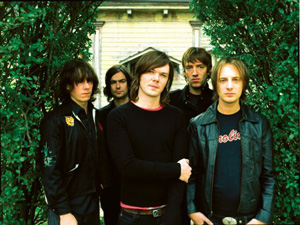 Let’s talk about the record: Fans, reviews, and Capitol publicity have all mentioned the Americana influence on Warnings/Promises. Care to elaborate?
Let’s talk about the record: Fans, reviews, and Capitol publicity have all mentioned the Americana influence on Warnings/Promises. Care to elaborate?
Actually, I think we’re quite Scottish, characteristically. Maybe it’s the lyrics or my vocal delivery, but as far as the music goes, yeah, we are into alt-country, alt-folk, Fugazi, Grateful Dead, and we made the record in California where we were listening to a lot of Crazy Horse, The Byrds, and we were interested in stripping down the arrangements, using acoustic guitars and very simple beats.
We spent three months making the record, which is a long time. The most we’d ever spent was maybe two months, but you live somewhere for three months and its geography definitely starts to seep into the music.
You guys started out much heavier and influenced by the likes of Black Flag and Slayer, do you still love heavy music, even though you no longer play it?
Of course! We are not solitary folk musicians sulking around all the time. (chuckles) Allan, in particular, loves heavy music. He’s has a death metal/hardcore project called Desalvo that’s excellent. We don’t always skip around meadows playing mandolin.
(laughs) How ’bout you?
What? Do I skip around in meadows?
(laughs) No, no, how ’bout what you’re listening to?
I liked the last Isis record. I also like Bruce Springsteen’s new one, and Sons and Daughters, but my girlfriend’s also in the band. (chuckles). I’ve been into old psych rock records, too. A lot of, uh, “tie dye music.”
(laughs) Greatful Dead, tie dye, you’re gonna confuse the hell out of the readers!
(chuckles) I’m just being truthful.
Didn’t you live in New York for a while after the album was made?
Yeah, we went there to mix, and I just stayed for the rest of the year. I was personally kind of lost during that time, and it was good for me to stop and live in one place for a while.
Would you care to elaborate on the meaning of “lost”?
Not like “looking around and ready to jump off a bridge” lost, but, I’d been in a band, traveling, waking up in a difference place every night since I was 19, 20. And that was great: I rolled with it and I can’t imagine living any other way. I love doing the band and living the lifestyle. But I needed something else, something I kind of like home. So I worked my way through some issues and did the whole cliché “finding myself” thing.
Everything’s good now. I moved back to Scotland in March, and the past few months have been just great. I feel more settled in. When I grew up, I didn’t like Scotland and always wanted to leave…
Is that what “Welcome Home” and “Disconnected” are about?
Yeah, but the entire album is sort of about finding yourself. Where you come from, where you belong, etc.
The narrative of “Disconnected” really rang a bell with me, since I grew up on three separate continents and – at this point in my life – have a difficult time finding where I “belong” and where my “hometown” is supposed to be.
Same with me. I grew up in Scotland, France, the U.S., and that sort of rootlessness was one of the things I had to learn to embrace. Even now, there’s an element of that in me, like I want to be like that. But I think it’s better to deal with the feelings and make peace with where you’re from. I don’t want to be 40, living under a bridge, telling people I used to be a popstar.
(laughs) On a side note, do you guys still play the older, heavier material live?
Yeah, it’s actually easier to play those songs now. We’re tighter and can actually play in time! (laughs)
But if you want your audience, particularly in the UK, to think of you as having moved beyond rudimentary punk, wouldn’t you steer clear of the past?
Maybe, but I think a lot of people come to our shows to see the old, energetic songs. And for our old fans, they can come and enjoy the kind of unpretentious, punk-ish atmosphere and listen to the old songs, even though we’re supposed to be more mainstream and polished now.
I don’t like listening to our older records, but I really enjoy playing the songs. It’s a different experience every night.
One last question: Can you elaborate on the album title? At first, I thought it meant “warnings and promises,” but then I heard the lyrics (“all promises are warnings”)…
They mean the same thing, don’t they? The record is about contradictions and working your way through them, seeing both sides, understanding, and accepting them.
(www.capitolrecords.com)

